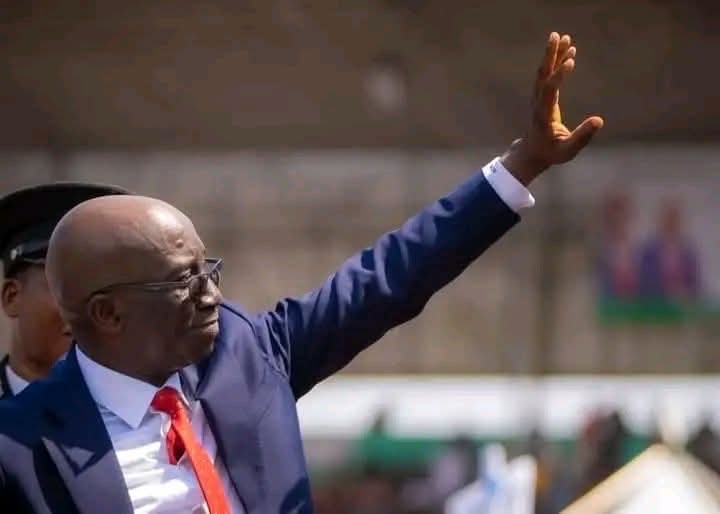UNARGUABLY, singing a national anthem elicits patriotism and pride from citizens of a country.
Political pundits agree that a national anthem symbolises the sovereignty of a country.
Nigeria’s first national anthem, “Nigeria We Hail Thee,’’ adopted in 1960, was written by Miss Lillian Williams, a Briton.
The current national anthem, “Arise, O Compatriots,’’ was adopted in 1978 to replace “Nigeria We Hail Thee.’’
The stanzas of the current anthem are the products of five winners in a competition conducted by the National Publicity Committee of Nigeria.
The winners were -John Ilechukwu, Eme Etim Akpan, B.A. Ogunnaike, Sota Omoigui and P.O. Aderibigbe.
The words were put together to compose the anthem by the Nigerian Police Band, under the directorship of late Benedict Odiase.
In the past, because of the importance attached to national anthem, children were taught in school to stand at attention while singing the anthem.
For now, that practice appears to be waning, while the tune of the anthem, in some cases, has been altered by artistes.
They attribute the development to poor attitude of the public to the nation’s cultural heritage as well as ignorance of their civic responsibilities.
For instance, some few years ago, it was surprising that some political appointees, who appeared for screening, were unable to recite the national anthem and the national pledge correctly.
Worried by the inability of many Nigerians to sing the national anthem, the National Orientation Agency (NOA), advocates that the second stanza of the national anthem should be adopted as “prayer’’ in public functions.
The stanza reads: “O God of creation, direct our noble cause, guide our leaders right, help our youths the truth to know, in love and honesty to grow and living just and true, great lofty heights attain, to build a nation where peace and justice shall reign.’’
Mr Paul Odenyi, said that NOA would not relent in its efforts to popularise the national anthem.
Odenyi, who is the Chief Press Secretary to the Director-General of NOA, however stressed that the anthem should not be used for adverts or the rendition changed.
“We must retain the original rendition of the national anthem and those who do it differently shouldn’t be doing it.
“The NOA has pointed out that we should try as much as possible to retain the original rendition, and part of the problem is that many people don’t have the original copy and don’t even know the original lyrics.
“Like all national symbols, there are distortions that have emerged over the years, and even the “Coat of Arms’’ have differed in colour overtime.’’
He said that in the original lyrics of the anthem, there is no “shall’’ in the last line of the second stanza, adding that no one knows where “shall’’ came from.
Odenyi however said that NOA has initiated an amendment of the ordinance act to address issues relating to national symbols; like wrong display of flags and to identify those entitled to use the Coat of Arms.
“The bill has been in the national assembly for the past two years and we’re hoping they will give it the attention it requires.
“It will help solve some of these problems, but the bigger duty for everybody is sensitisation so that people will know.
“Many don’t know that if you have the national flag displayed at your office, you should lower it by six p.m. or put on a light to indicate that the nation doesn’t sleep; and that there should be no company flag at the same level with the flag,’’ he said.
Mrs Magdalene Akujobi, a banker, stressed the need to maintain the sacredness and originality of our national ethos.
“Our national symbols should be a source of pride to us and ought not to be mere ceremonial items, rather they should stand as the hallmark of patriotism and nationalism.’’
Mrs Stella Azi, a civil servant, said the national anthem is a national identity, “I don’t think it is right to sing or recite it differently from the original composition.
“When a football match is about to begin and the national anthem of any country is being sung, everybody stands and the rhythm tells you which countries is playing.
“But when they start singing it like jazz, I see it changing the identity and I’ve never been in support of that, ’’she said.
Dr Adinoyi Onukaba, a lecturer at the University of Abuja, said there was nothing wrong if the composition or version differed from the original as far as the message was not lost.
“There’s nothing wrong with it, the most important thing is to be faithful to the wordings of the anthem; in terms of trying to sing or recite it, it can vary; people should have the freedom to play with it.
“It’s like a play, a director could come and give it his own interpretation; the most important thing is that the interpretation must not in any way destroy the original vision or message of the author.
“He can decide to emphasise one aspect of it, and as a creative work the interpreter must have freedom to do whatever he wants with it,’’ he said.
Stakeholders want NOA to intensify its orientation and re-orientations programmes in order to return the nation to the good old days when national ethos were cherished and respected.

NIGERIA FLAG

